
Sep 28, 2016
At least one person has died in Uzbekistan cotton fields so far this season, part of the country’s massive mobilization of compulsory labor in which nurses, teachers, students and state employees are forced from clinics and classrooms to toil for weeks picking cotton.
Komiljon Asimov, 20, a biology student at Abduhab State University, died September 11, days after university students were the first group mobilized by the Uzbek government for the fall cotton harvest. In another incident, Dilarom Juraev, 28, suffered a miscarriage in the fields.
Each harvest, Uzbekistan mobilizes more than 1 million residents to pick cotton through systematic coercion. From September through October, many classrooms shut down because teachers are among those forced to pick cotton. Health clinics and hospitals are unable to function fully with so many health care workers also toiling in the fields.
‘You Work Like a Slave from Morning to Night’
“Dinner takes place in the field again. For the dinner we are normally given watery soup,” writes one university economics student from the Andijan Agricultural Institute, who is now picking cotton. “I have no strength left. You work like a slave from morning till night, not enough food, and should sleep and wake up hungry again.”
The student, whose story was collected by the Uzbek-German Forum (UGF), describes being forced from her studies with other classmates to take part in the government-led mobilization. They are housed in a local school building emptied of students, where they sleep on a cold floor, with no showers and limited sanitary facilities.
The student says she spent hundreds of dollars of her family’s money buying food and warm clothing to prepare for working some two months in the cotton fields. Nearly 10,000 students from the four universities in the Andijan region were forcibly sent to work starting September 8.
Uzbeks Coerced into Signing ‘Voluntary Participation’ Letters
Last year, the government went to extreme measures—including jailing and physically abusing researchers independently monitoring the process—to cover up its actions. This year, the tactic appears to be widespread coercion of students, health care workers and others to sign letters indicating they are “voluntarily” participating in the cotton harvest, according to UGF. Employees are told they will lose their jobs and students threatened that they will be expelled from the university if they do not pick cotton or agree to gathering a set weight of cotton each day.
In one video, Alia Madalieva, the head nurse at Clinic No. 8 in Kokand City, dictates to employees the text for their “letter of commitment.” Seated next to a clinic employee in the cotton fields, she dictates: “If I do not collect 50 kg (kilograms) of cotton a day, I will voluntarily hand in my letter of resignation. I wrote this on my own.”
Uzbekistan and Turkmenistan, another country where forced labor in cotton harvests is rampant, this year were downgraded to the lowest ranking in the U.S. State Department’s 2016 Trafficking in Persons Report. Uzbekistan, which gets an estimated $1 billion per year in revenue from cotton sales, also forces farmers to plant state-ordered acreage of cotton and wheat or face the loss of their land.
More personal stories from those forced to pick cotton and other documentation are available at UGF’s new microsite. The UGF is a member of the Cotton Campaign, as is the Solidarity Center, The campaign works to end the injustice of forced labor in cotton harvesting in Uzbekistan and Turkmenistan.
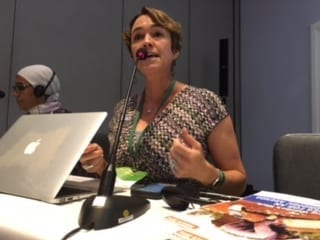
Sep 10, 2016
Globally, women are paid 30 percent less than men—but “imagine instead of corporations making 30 percent more off women’s labor, imagine if that 30 percent were coming back to our communities in the form of wages,” says Shawna Bader-Blau, Solidarity Center executive director.
Speaking on the panel, “Women’s Economic Empowerment and Workers Rights,” a Solidarity Center-sponsored session at the 2016 Association of Women’s Rights in Development (AWID) Forum, Bader-Blau said challenging such wide-reaching corporate power means “we need to partner across social movements.”
Cross-movement building is a goal and theme of the September 8–11 AWID Forum, where more than 1,800 participants from 120 countries are gathering to find strategies for mobilizing greater solidarity and collective power across diverse movements.
Union and worker association leaders from Brazil, Morocco and the United States taking part in the panel shared how unions are helping empower women to achieve economic justice.
Seventy million women around the world are in labor unions or worker associations, says Bader- Blau. “The labor movement is by definition the broadest movement for women on earth that is membership based.”
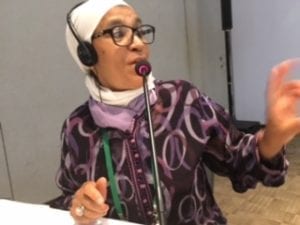
“In the frontlines of this battle we have women who are fighting for labor rights”—Saida Bentahar, CDT Morocco.
In Morocco, the Democratic Confederation of Labor (CDT) in Morocco is helping agricultural workers win bargaining rights with their employers. Most of the workers are women, who live in difficult, fragile conditions, says Saida Bentahar, a member of the CDT Secretariat.
“They sometimes cannot read or write, they live in extreme poverty, they are not paid good wages,” she said, speaking through a translator.
Together with the Solidarity Center, the CDT is training women on their workplace rights, including standing up against sexual harassment.
“Some women wouldn’t even speak at first when we would hold sessions but now they really stand up for what they believe,” says Bentahar. “Together they have written a declaration to guarantee stable labor rights. They will now have equal pay, certificates to assure their skills and capacities. They will have equal opportunities for work and training as well.”
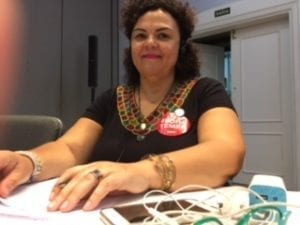
Junéia Batista, CUT national secretary in Brazil, describes union women’s efforts to negotiate day care and other key issues in bargaining with employers. Credit: Solidarity Center/Tula Connell
Junéia Batista, national secretary of the Confederation of Workers Union (CUT) in Brazil, described how women in the confederation have worked to be part of contract negotiations to ensure issues like day care are included, and to achieve leadership since the confederation formed in 1983.
“We want more,” says Batista, speaking through a translator. “It has been 33 years with men, men, men presiding in the presidency,” she says, and women members are working to establish gender equality measures throughout their union structures.
In Mississippi, a state in the southern United States, the Mississippi Worker’s Center for Human Rights (MWCHR) is helping empower working people in Oxford, an impoverished area with a history of racial violence.
“Wages are not the only point of resistance and struggle we need to be dealing with,” says Jaribu Hill, MWCHR executive director.
Panelists also discussed the increasing attacks throughout the world on workers’ ability to form unions.
“Our broader labor movement is suffering from a closing of democratic space,” says Bader-Blau, citing a 30 percent rise in attacks on worker rights around the world. “Our governments, aided by corporate power, are defining worker rights in narrower and narrower terms.”
“In this environment, in this context, we feel it is so important that women’s work be respected and valued … and dignified and that we fight for this,” she says. “The primarily vehicle for fighting for women’s rights at work is trade unionism.”
As Bentahar says, “In the frontlines of this battle we have women who are fighting for labor rights.”
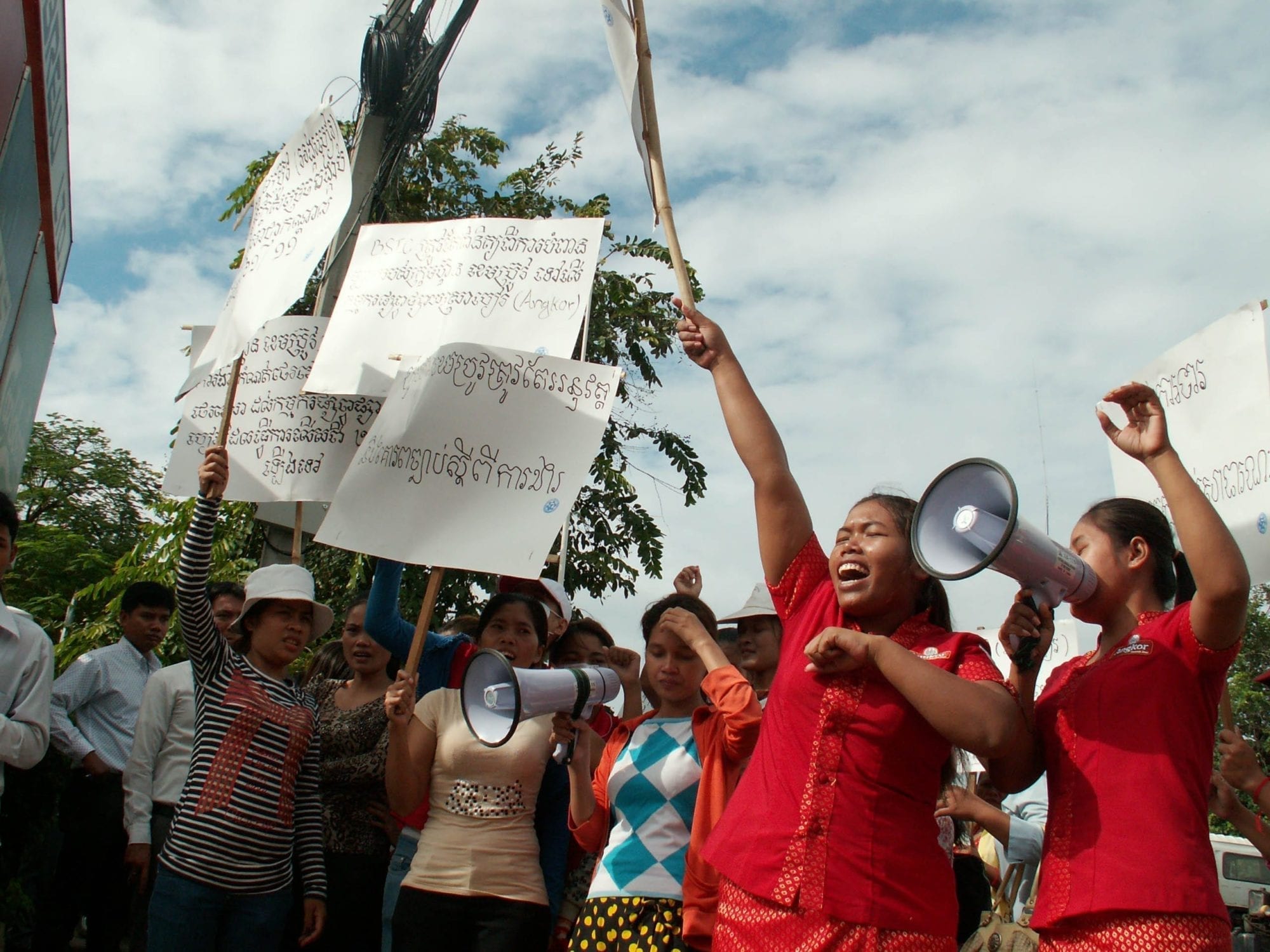
Sep 8, 2016
Women, people of color, indigenous and other disenfranchised and marginalized groups have been hit especially hard by the increasing concentration of transnational corporate power and escalating global economic inequality—but a new report showcases how women and oppressed people are shifting the dynamic through their own power of resistance.
Key to the success of such movements, according to the report, “Challenging Corporate Power: Struggles for Women’s Rights, Economic and Gender Justice,” is “a deliberate effort to unite experiences and struggles across different movements.”
“Each struggle … uses cross movement collaboration in some way to defy corporate power,” according to the report.
“Challenging Corporate Power” stems from an early 2016 cross-movement dialogue convened by the Association of Women’s Rights in Development (AWID) and the Solidarity Center. Facilitated by Just Associates (JASS) in São Paulo, Brazil, the meeting brought together women trade unionists, women workers, feminists, indigenous and black women, lesbian, bisexual, trans, queer, Intersex (LBTQI) activists, av nd women human rights defenders to discuss, debate and share understanding of corporate power, and what it means to their struggles and their lives.
The report will be released September 10 at AWID’s 13th International Forum in Bahia, Brazil, where more than 1,800 participants are gathered this week to strategize around “Feminist Futures: Building Collective Power for Rights and Justice,” the report’s key finding. Cross-movement initiative sessions throughout the conference include the Solidarity Center-sponsored “Building Alliances to End Gender-Based Violence in the World of Work,” a three-hour discussion how gender-based violence at work links to larger struggles for economic and gender justice. The Solidarity Center also is holding a panel on “Women’s Economic Empowerment and Worker Rights,” moderated by Solidarity Center Executive Director Shawna Bader-Blau.
Women Workers Form Unions to Reverse Tide of Inequality
At the January meeting, participants discussed five successful movements to demand accountability—for labor rights violations, ecological damage, trade liberalization and privatization. Women beer promoters in Cambodia, for example, are increasingly forming unions with the Cambodian Food Service Workers Federation (CFSWF) to protest against poverty wages, sexual harassment and violence, long working hours and toxic working conditions in bars and restaurants.
They are some of the 70 million women organized in trade unions today, with many millions more in cooperatives and other worker rights associations, according to the report. Increasingly, there “is a call to scale up struggles of resistance, build bridges between different social movements, and foster and grow people’s power to build new forms of production, consumption and distribution of the world’s social and economic resources,” the report finds.
Through a lens of power analysis developed by JASS, the report examines how corporate power—defined as an excessive control and appropriation of natural resources, labor, information and finance by an alliance of powerful corporations and global elites in collusion with government—affects gender justice, women’s rights and lives through its influence on police that shape the global economy.
The power analysis lens illustrates how corporate power operates and its impacts on women and oppressed peoples. For instance, 63 percent of the top 175 global economic entities are transnational corporations, not countries, a concentration of power that affects gender justice, women’s rights and lives through its influence on policies that shape the global economy.
At the same time, some 70 percent of workers are in vulnerable employment. Women from racially and ethnically marginalized groups and migrant women worldwide, including those living in the global North, have less access to education and skills training, are responsible for an unequal share of unpaid work and domestic homes and are more likely to be in low paid and informal employment without social security benefits.
The recommendations and reflections emerging in the last moments of the Cross Movement Dialogue speak to how women trade unionists, LBTQI activists, feminists, indigenous women and women human rights defenders can sustain their victories by consolidating the power within their movements, nurturing collective power with other social movements, and exerting power over corporations and governments acting in their interest.
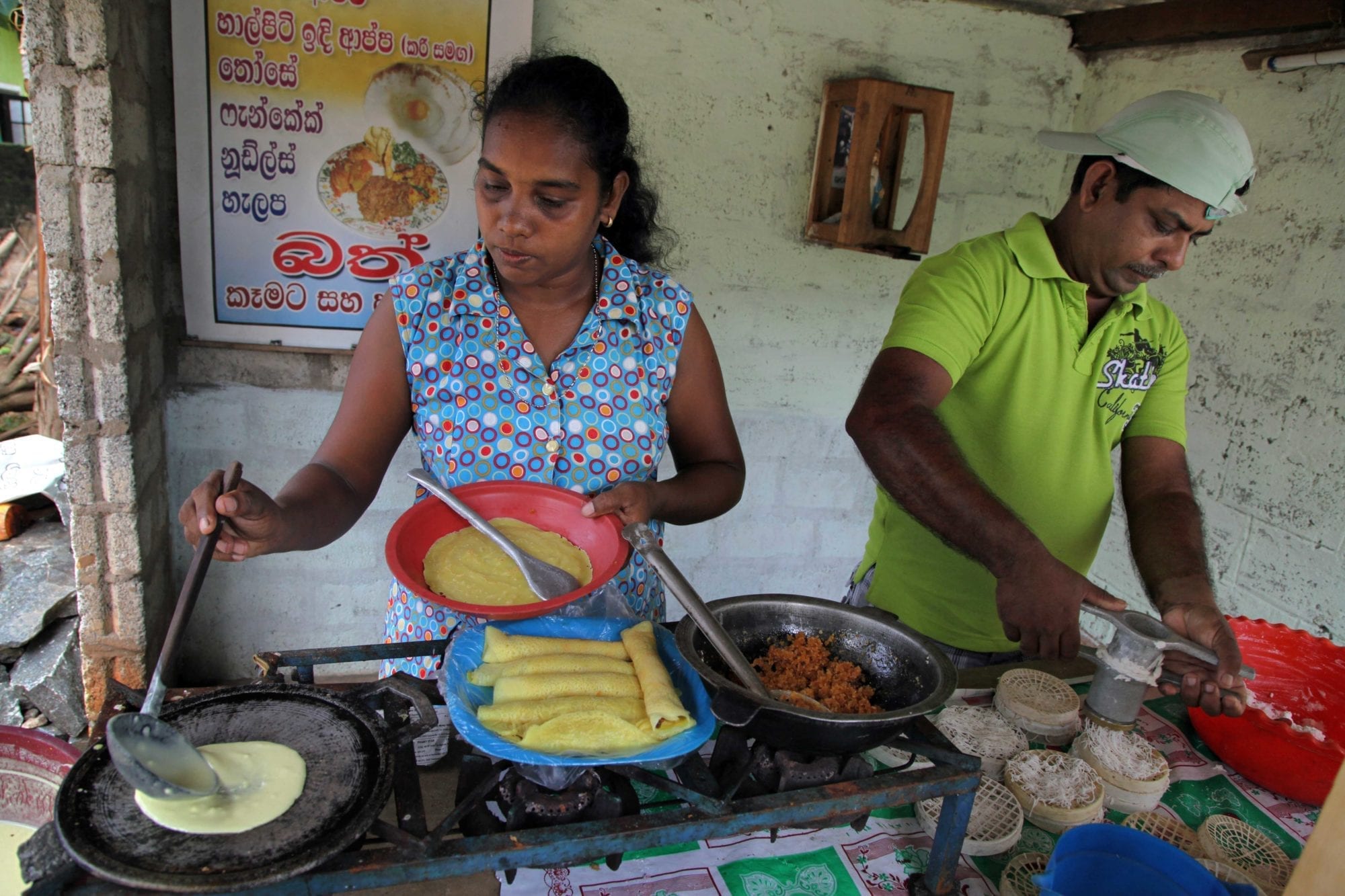
Sep 7, 2016
The 2009 end of Sri Lanka’s civil war was an opportunity for workers to return to the security and protections of the formal economy, which had been destabilized by 26 years of violence. However, a new Solidarity Center survey finds that peace has yet to bring the hoped-for economic gains to workers in Jaffna, the capital of Sri Lanka’s Northern Province. The survey’s findings on working conditions are especially important because the exploitation of workers is not only a setback for healthy industrial relations in Sri Lanka’s economy, but has the potential to aggravate social tensions and interfere with the ongoing process of peacebuilding.
“The bulk of the workers in Jaffna are in low-paid jobs with minimal labor standards, social protection and security of tenure, which are not conducive to creating sustainable livelihoods,” according to the summary.
“A key element to address conflict is equal treatment under the law,” says Tim Ryan, Asia regional program director at the Solidarity Center, who presented the survey’s findings during a recent discussion of the report at the National Endowment for Democracy (NED) in Washington, D.C.
According to Ryan, the survey seeks to provide economic data on workers in Northern and Eastern Sri Lanka that go beyond employment statistics. “Are they finding ways to both protect their rights under the law? Are laws and standards being equitably enforced?”
Workers Rights Laws Not Enforced
Despite worker-friendly Sri Lankan legislation like the Employees’ Provident Fund (EPF), an employer-funded government social security that has existed for decades, the Solidarity Center’s survey shows a majority of workers—76 percent—do not have the labor rights they are legally guaranteed due to a lack of enforcement. Of that percentage, only 22 percent of female respondents and 46 percent of male respondents say they receive what they are owed by the EPF.
The gendered difference in access to social protections is only one example of a trend persistent throughout the survey’s results, which suggests that female workers are disproportionately disadvantaged under the current conditions. A large wage gap exists between male and female respondents, including between employees doing identical work. The rate of female unemployment is nearly double that of male unemployment. And more than 80 percent of female respondents say they are unaware of their right to overtime benefits, compared with 49 percent of male respondents.
More such initiatives are needed. Although Sri Lanka is a member of the International Labor Organization (ILO), the survey confirms that more progress is needed to move the country toward the goals outlined in the ILO’s agenda for decent work. While ongoing tension and inequalities in Sri Lankan politics complicate the protection of worker rights through legislation, workers’ organizations like trade unions can help hold employers accountable to their employees and bring Sri Lanka in line with the standards of the international community.
“Workers in Post-Civil War Jaffna: A Snapshot of Working Conditions, Opportunities and Inequalities in Northern Sri Lanka” was made possible through a NED grant.
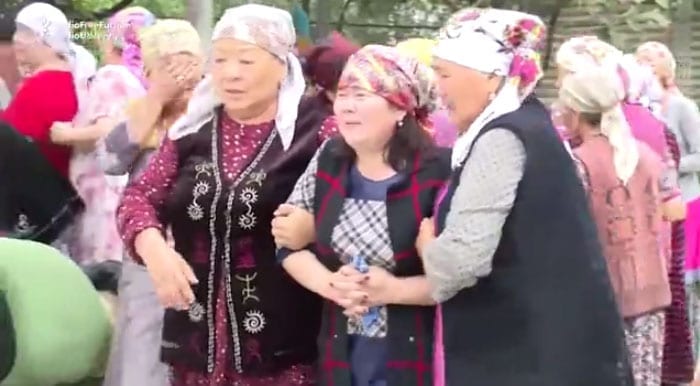
Sep 1, 2016
The search for a better future and the means to support their families in Kyrgyzstan ended tragically for 14 migrant workers Saturday, August 27, in Moscow, when their printing plant caught fire. All of the victims were young women, including two 17-year-old girls, according to reports. Three Russian workers also died.

One of two young Kyrgyz women killed in a Moscow factory fire. Credit: Radio Free Europe/Radio Liberty
Burials for the workers were held August 31, in towns around Kyrgyzstan.
The mother of a 21-year-old lost in the fire told Radio Free Europe, “With no work here, the Kyrgyz have to leave.”
The majority of Kyrgyz who leave their country to find work—estimated at about 500,000—head for Russia. There they often face discrimination, exploitation and unsafe working conditions. In the last five years, an estimated 1,500 Kyrgyz migrants to Russia died in workplace and other incidents.
“The stories of the victims are the same: unemployment, poverty, migration,” says Lola Abdukadyrova, Solidarity Center program coordinator in Kyrgyzstan. “They hoped to gain enough money to help to their families.”
Over the last year, more than 1,000 people went through the pre-departure trainings for the migrants conducted by the Solidarity Center in all regions of Kyrgyzstan. They were briefed about their rights and responsibilities while staying in the Russian Federation, with special attention to the legal aspects of employment. Workers were urged to finalize individual employment contracts, in particular, during the trainings. In addition, the Garment, Metallurgy and Mining, Transport and Retail Workers’ Unions actively supported an informational campaign to support migrant workers, putting up posters and installing informational boards in the biggest markets, bus stations and airports across the republic.








